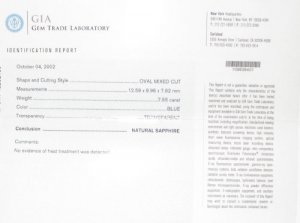- Joined
- Jun 29, 2008
- Messages
- 10,261
I was just tidying up my gemstone certificates and wondered which Labs you "trust"? I know that''s an odd question and I''m not talking about GIA, EGL, etc but the smaller ones such as:-
LabTrade (based in Thailand)
GIT Memos
Personally the LabTrade ones seem to err on the side of caution (which I like). For example on a Demantoid Garnet certificate it says "horsetail inclusions indicate possible Russian origin". The GIT Memos (although don''t look wildly professional) do seem to test for chemical makeup and will distinguish between groups of Tourmalines.
I came across a piece of paper from Burapha Laboratory (I''d forgotton I had this) but in all honesty it looked a bit suspect!!!!
Any good or bad experiences with the above? Please add any other Labs and your feeling about their certificates
LabTrade (based in Thailand)
GIT Memos
Personally the LabTrade ones seem to err on the side of caution (which I like). For example on a Demantoid Garnet certificate it says "horsetail inclusions indicate possible Russian origin". The GIT Memos (although don''t look wildly professional) do seem to test for chemical makeup and will distinguish between groups of Tourmalines.
I came across a piece of paper from Burapha Laboratory (I''d forgotton I had this) but in all honesty it looked a bit suspect!!!!
Any good or bad experiences with the above? Please add any other Labs and your feeling about their certificates









300x240.png)